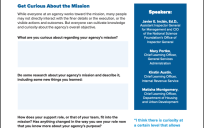According to OPM, fundamental competencies are “the personal and professional attributes that are critical to successful performance” in the Senior Executive Service (SES). Think of them as the building blocks of Executive Core Qualifications (ECQs), the five qualifications that help build federal culture. The ECQs are leading change, leading people driving results, displaying business acumen and building coalitions.
However, even if you don’t want to become a part of the SES, fundamental competencies are great skills to master. By learning how to become more respectful, articulate and honest, you’ll make yourself invaluable wherever you go.
Here are ways to master the fundamental competencies at every level.
Interpersonal Skills
Interpersonal skills consist of getting along with coworkers and treating others with respect. While this may seem simple to hone (you’re either a jerk or you’re not), there are nuances to mastering interpersonal skills.
Tackle the basics – Start by treating others the way you want to be treated. Before sending a message, read it and think of how you would feel if you received that message. If an email sounds too cold, revise it to add warmth. Also, respond to coworkers promptly. Don’t leave your fellow employees waiting for your response. So, if you have 20 unread messages, start reading them.
Master this competency- Start listening to the perspectives that differ from yours. Speak to your staff about the policies that they prefer. Speak to those whose views oppose yours to understand where they are coming from. Doing this will show your open-mindedness.
Oral Communication
Oral communication consists of speaking and listening. Can you present information clearly and effectively? Do you listen to others and ask clarifying questions when you don’t understand a concept? If not, here are some helpful tips.
Tackle the basics – Start giving your supervisor and team members updates on your projects. These updates will help them understand your bandwidth and give them more context about the team’s work overall.
Master this competency – Once you communicate effectively internally, you can increase your communication with stakeholders. Think more strategically about your communication with stakeholders so you can present information in a way that clearly benefits them and your organization. Challenge yourself to communicate sensitive information in a tactful manner. When communicating about a complex topic, do the research in advance so you can seem like an expert and clarify any questions thrown your way.
Integrity/Honesty
Displaying integrity and honesty is vital to acquiring and maintaining trust. Sometimes it only takes one murky situation for others to distrust you. Here’s how you can show others you are fair and ethical.
Tackle the basics – When giving feedback, be as objective as possible. Check your unconscious biases and don’t play favorites with your coworkers. If you have concerns with a fellow employee, don’t turn it into (virtual) watercooler gossip. Address it in a dignified and private way that will result in a peaceful resolution.
Master this competency – Once you have a supervisory role, you will have the ability to understand if your employees do not feel psychologically safe and you have the power to change that. Work to make your organization honest. Most importantly, own your mistakes and the mistakes of your agency.
Written Communication
Similar to oral communication, written communication involves relaying information in a clear, concise manner.
Tackle the basics – Knowing how to draft polished briefs and press releases that require few to no edits is important for entry-level employees. You also need to understand how to summarize reports and create outlines for projects.
Master this competency – Once you’ve conquered basic written communication, you can work on high-level deliverables. Challenge yourself to write reports that focus on topics outside of your comfort zone. Does your boss need cybersecurity white papers? Volunteer to work on this, even if technology isn’t your forte. These materials will help high-level individuals with their work. You can also start editing and offering editorial advice about technical reports for colleagues.
Continual Learning
It’s never too late to learn. Continual learning prevents us from stagnating in our careers.
Tackle the basics – In order to know what kind of professional development help you need, speak with your manager. Since they oversee your work, they will have the most holistic understanding of your strengths and weaknesses. Creating an Individual development plan (IDP) can also help you understand where to focus. Check out GovLoop’s IDP Toolkit for more information.
Master this competency – Your professional development does not have to only help you; it can benefit your entire organization. Use what you learn in training to change the way your agency operates. If you learn about tactics to handle diversity, see how these tips can be shared agencywide. Think of areas where your organization is currently weak and become an expert on those topics so you can improve your agency.
Public Service Motivation
When you work in the public sector, guess who is your most important client? The public. Make sure your work includes their feedback.
Tackle the basics – Incorporating human-centered design into your projects is a great way to serve the public. As a result, your project will be oriented towards what constituents need.
Master this competency – Start working with community stakeholders to create action plans. You can also develop programs that will directly help the public, even if your role is not public-facing.
The NextGen Government Training Summit is a virtual two-day training event for public servants to learn, innovate and get to the next level in their career. The Summit will be hosted online on August 4-5, 2021. Learn more here.
![]()





Leave a Reply
You must be logged in to post a comment.